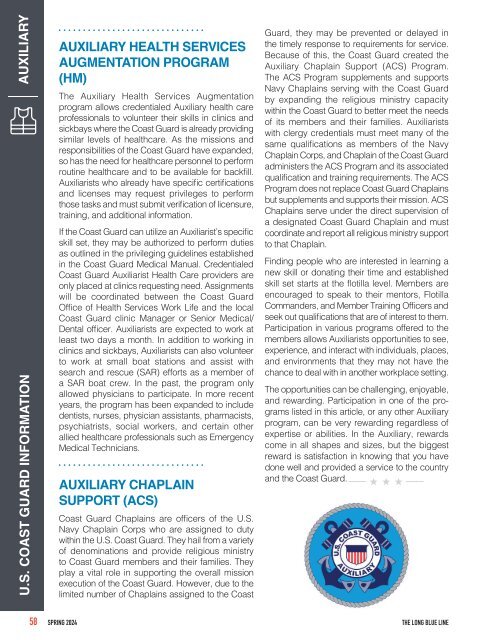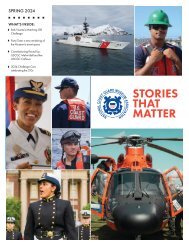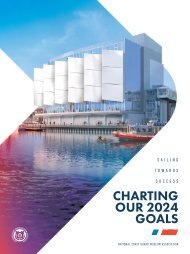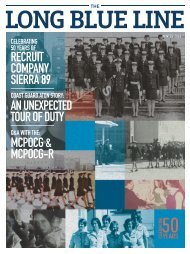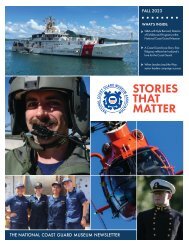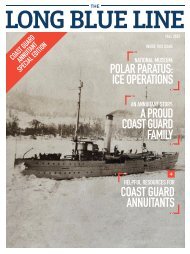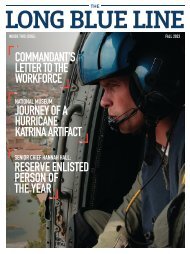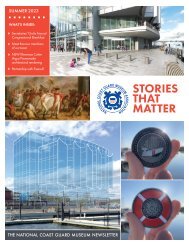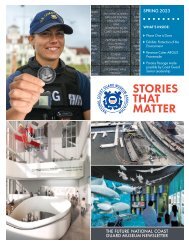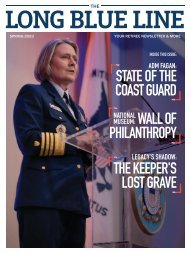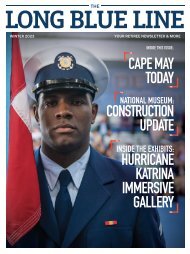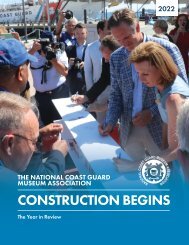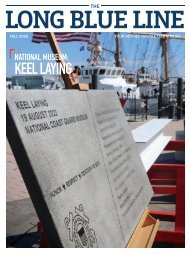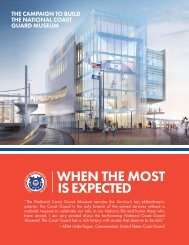The Long Blue Line (Spring 2024)
United States Coast Guard quarterly magazine exploring all things Coast Guard.
United States Coast Guard quarterly magazine exploring all things Coast Guard.
Create successful ePaper yourself
Turn your PDF publications into a flip-book with our unique Google optimized e-Paper software.
U.S. COAST GUARD INFORMATION AUXILIARY<br />
AUXILIARY HEALTH SERVICES<br />
AUGMENTATION PROGRAM<br />
(HM)<br />
<strong>The</strong> Auxiliary Health Services Augmentation<br />
program allows credentialed Auxiliary health care<br />
professionals to volunteer their skills in clinics and<br />
sickbays where the Coast Guard is already providing<br />
similar levels of healthcare. As the missions and<br />
responsibilities of the Coast Guard have expanded,<br />
so has the need for healthcare personnel to perform<br />
routine healthcare and to be available for backfill.<br />
Auxiliarists who already have specific certifications<br />
and licenses may request privileges to perform<br />
those tasks and must submit verification of licensure,<br />
training, and additional information.<br />
If the Coast Guard can utilize an Auxiliarist’s specific<br />
skill set, they may be authorized to perform duties<br />
as outlined in the privileging guidelines established<br />
in the Coast Guard Medical Manual. Credentialed<br />
Coast Guard Auxiliarist Health Care providers are<br />
only placed at clinics requesting need. Assignments<br />
will be coordinated between the Coast Guard<br />
Office of Health Services Work Life and the local<br />
Coast Guard clinic Manager or Senior Medical/<br />
Dental officer. Auxiliarists are expected to work at<br />
least two days a month. In addition to working in<br />
clinics and sickbays, Auxiliarists can also volunteer<br />
to work at small boat stations and assist with<br />
search and rescue (SAR) efforts as a member of<br />
a SAR boat crew. In the past, the program only<br />
allowed physicians to participate. In more recent<br />
years, the program has been expanded to include<br />
dentists, nurses, physician assistants, pharmacists,<br />
psychiatrists, social workers, and certain other<br />
allied healthcare professionals such as Emergency<br />
Medical Technicians.<br />
AUXILIARY CHAPLAIN<br />
SUPPORT (ACS)<br />
Coast Guard Chaplains are officers of the U.S.<br />
Navy Chaplain Corps who are assigned to duty<br />
within the U.S. Coast Guard. <strong>The</strong>y hail from a variety<br />
of denominations and provide religious ministry<br />
to Coast Guard members and their families. <strong>The</strong>y<br />
play a vital role in supporting the overall mission<br />
execution of the Coast Guard. However, due to the<br />
limited number of Chaplains assigned to the Coast<br />
Guard, they may be prevented or delayed in<br />
the timely response to requirements for service.<br />
Because of this, the Coast Guard created the<br />
Auxiliary Chaplain Support (ACS) Program.<br />
<strong>The</strong> ACS Program supplements and supports<br />
Navy Chaplains serving with the Coast Guard<br />
by expanding the religious ministry capacity<br />
within the Coast Guard to better meet the needs<br />
of its members and their families. Auxiliarists<br />
with clergy credentials must meet many of the<br />
same qualifications as members of the Navy<br />
Chaplain Corps, and Chaplain of the Coast Guard<br />
administers the ACS Program and its associated<br />
qualification and training requirements. <strong>The</strong> ACS<br />
Program does not replace Coast Guard Chaplains<br />
but supplements and supports their mission. ACS<br />
Chaplains serve under the direct supervision of<br />
a designated Coast Guard Chaplain and must<br />
coordinate and report all religious ministry support<br />
to that Chaplain.<br />
Finding people who are interested in learning a<br />
new skill or donating their time and established<br />
skill set starts at the flotilla level. Members are<br />
encouraged to speak to their mentors, Flotilla<br />
Commanders, and Member Training Officers and<br />
seek out qualifications that are of interest to them.<br />
Participation in various programs offered to the<br />
members allows Auxiliarists opportunities to see,<br />
experience, and interact with individuals, places,<br />
and environments that they may not have the<br />
chance to deal with in another workplace setting.<br />
<strong>The</strong> opportunities can be challenging, enjoyable,<br />
and rewarding. Participation in one of the programs<br />
listed in this article, or any other Auxiliary<br />
program, can be very rewarding regardless of<br />
expertise or abilities. In the Auxiliary, rewards<br />
come in all shapes and sizes, but the biggest<br />
reward is satisfaction in knowing that you have<br />
done well and provided a service to the country<br />
and the Coast Guard.<br />
58 SPRING <strong>2024</strong><br />
THE LONG BLUE LINE


